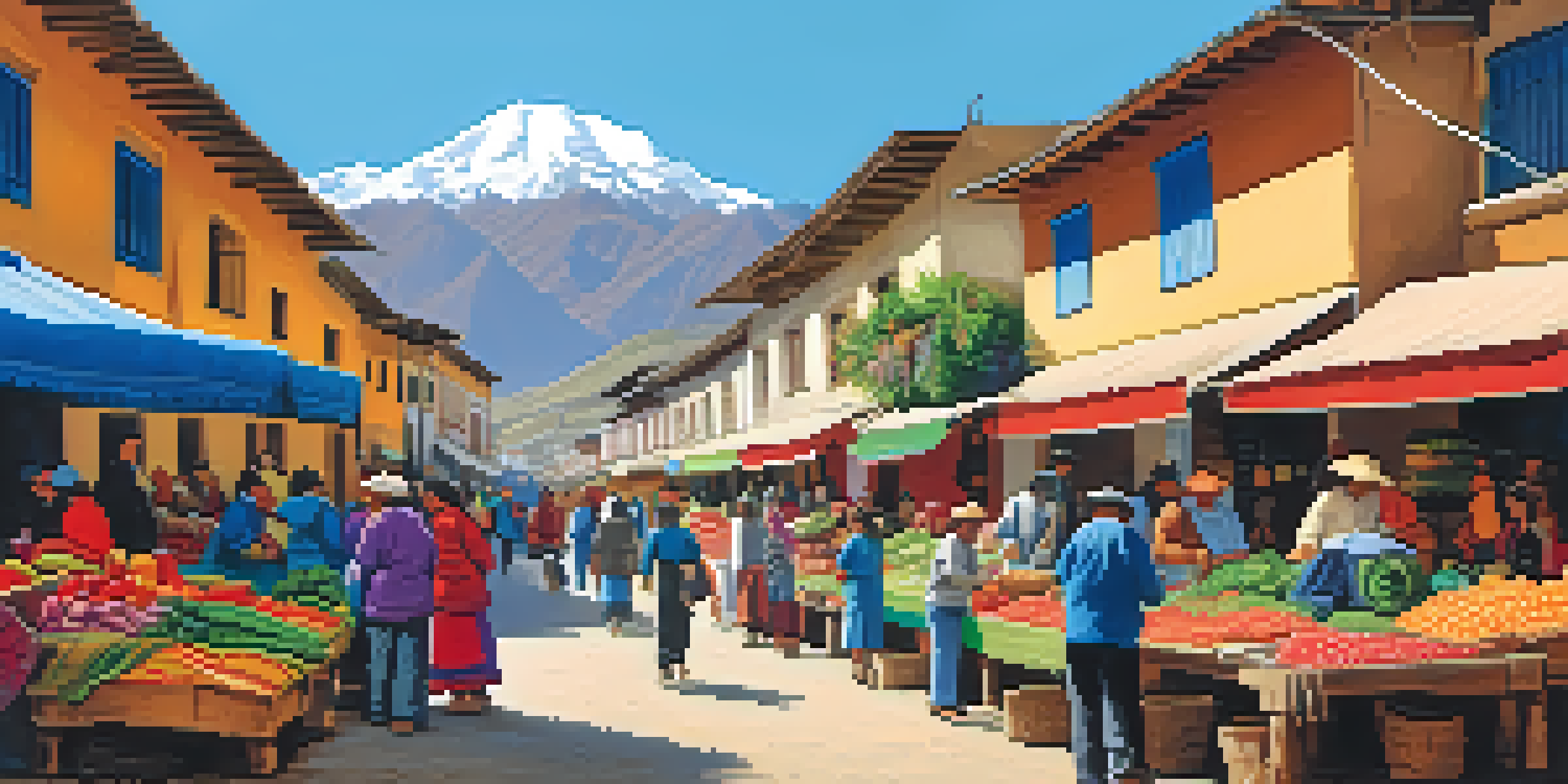Polite Expressions to Use When Speaking Spanish in Peru

Understanding the Importance of Politeness in Peru
In Peru, like many Latin American countries, politeness is highly valued in communication. It reflects respect and consideration for others, which is crucial in building relationships. When you speak Spanish in Peru, using polite expressions can make a significant difference in how your message is received.
Politeness is a sign of dignity, not subservience.
Peruvians often appreciate when foreigners make an effort to speak their language, especially with polite phrases. This not only shows your willingness to engage but also deepens connections. Therefore, understanding and using these expressions can enhance your experience in social or business interactions.
Ultimately, politeness can open doors and create a warm atmosphere in conversations. Whether you're asking for directions or negotiating a deal, being courteous can leave a lasting impression. So, let's explore some essential polite expressions to help you navigate these interactions.
Basic Polite Greetings to Start Conversations
Starting a conversation with a polite greeting sets a positive tone. Common expressions like '¡Hola!' (Hello) or 'Buenos días' (Good morning) are great ways to begin. Adding 'Por favor' (Please) when making requests also shows respect and friendliness.

Using titles can further enhance your politeness. In Peru, addressing someone as 'Señor' (Mr.) or 'Señora' (Mrs.) followed by their last name is customary, especially in formal settings. This small gesture makes a big difference in how you are perceived.
Politeness Builds Stronger Connections
Using polite expressions in Peru enhances communication and fosters deeper relationships.
Remember, a friendly smile goes hand in hand with your greetings. Combining your words with a warm demeanor can make interactions more pleasant. By starting off on the right foot, you pave the way for a more engaging dialogue.
Expressing Gratitude in Everyday Situations
Expressing gratitude is fundamental in any culture, and in Peru, saying 'Gracias' (Thank you) is essential. Whether someone helps you with directions or serves you a meal, showing appreciation fosters goodwill. You can also say 'Muchas gracias' (Thank you very much) for added emphasis.
Kindness is the language which the deaf can hear and the blind can see.
For more formal situations, you might use 'Le agradezco' (I thank you) to convey deeper respect. This expression is particularly suitable in business contexts or when addressing someone of higher status. It shows that you value their assistance or contribution.
Incorporating gratitude into your daily interactions not only reflects your character but also creates a positive environment. A simple 'Gracias' can go a long way in building rapport, making those around you feel valued and acknowledged.
Polite Requests: Using 'Por Favor' Effectively
'Por favor' (Please) is a key expression in making polite requests in Spanish. Whether you're asking for information or ordering food, using this phrase is crucial. It softens your request and shows that you are considerate of the other person's time and effort.
When formulating requests, it's helpful to structure them politely. For instance, instead of saying 'Dame eso' (Give me that), you could say '¿Me podría dar eso, por favor?' (Could you give me that, please?). This not only sounds more gracious but also invites a more positive response.
Key Polite Phrases to Use
Incorporating phrases like 'por favor' and 'gracias' is essential for respectful interactions.
By consistently using 'por favor' in your conversations, you cultivate a respectful dialogue. It reflects your understanding of local customs and enhances your interactions with Peruvians, making them feel appreciated.
Apologizing Gracefully: The Power of 'Lo Siento'
In any culture, knowing how to apologize is crucial, and in Peru, 'Lo siento' (I'm sorry) is your go-to phrase. Whether you accidentally bump into someone or miss an appointment, expressing regret is important. A sincere apology shows humility and respect for others' feelings.
For more formal situations, you might say 'Disculpe' (Excuse me) when trying to get someone's attention or when you need to interrupt. This polite acknowledgment helps soften your approach, especially in professional settings.
Remember, sincerity is key when apologizing. A genuine 'Lo siento' can mend misunderstandings and restore harmony. By being open and respectful, you foster stronger relationships in your interactions.
Using '¿Cómo Está?' to Inquire About Well-being
'¿Cómo está?' (How are you?) is a common and polite way to check in with someone. This expression is not only a greeting but also shows that you care about the other person's well-being. Using it in conversations can create a friendly atmosphere.
When speaking to someone you don't know well, using the formal version '¿Cómo está usted?' is more appropriate. This shows respect and acknowledges the social hierarchy that exists in Peru. It’s a small change that can make a big impact in how you're perceived.
Ending Conversations Politely Matters
Concluding interactions with courtesy leaves a lasting positive impression and encourages future dialogue.
Incorporating this inquiry into your conversations can lead to more meaningful exchanges. It opens the door for others to share about themselves, which can help you build rapport and create connections.
Ending Conversations with Courtesy and Grace
Concluding a conversation politely is just as important as starting one. Phrases like 'Fue un placer hablar contigo' (It was a pleasure talking to you) or 'Hasta luego' (See you later) leave a positive impression. They signal that you value the interaction and hope to continue it in the future.
If you need to leave abruptly, saying 'Disculpa, tengo que irme' (Sorry, I have to go) conveys your respect for the other person’s time. This shows that you care about the relationship and are acknowledging the moment you shared.

Ending on a polite note encourages future interactions. It reinforces the idea that you appreciate the connection made, which is vital in building lasting relationships in Peru.
Putting It All Together: Practicing Politeness in Peru
As you prepare for your conversations in Peru, remember that practicing these polite expressions can greatly enhance your experience. Start by incorporating greetings, gratitude, and polite requests into your daily interactions. The more you use them, the more natural they will become.
Consider practicing with native speakers, whether through language exchange or casual conversations. This real-world application will help you gain confidence and fluency in using these expressions appropriately. Plus, locals often appreciate your effort to communicate respectfully.
Ultimately, being polite in your interactions fosters goodwill and opens up opportunities for deeper connections. By embracing these expressions, you not only enrich your language skills but also create meaningful relationships during your time in Peru.